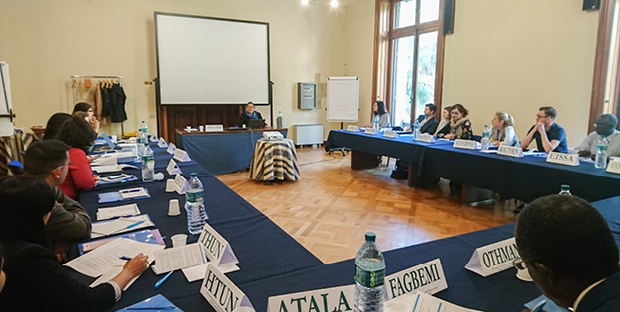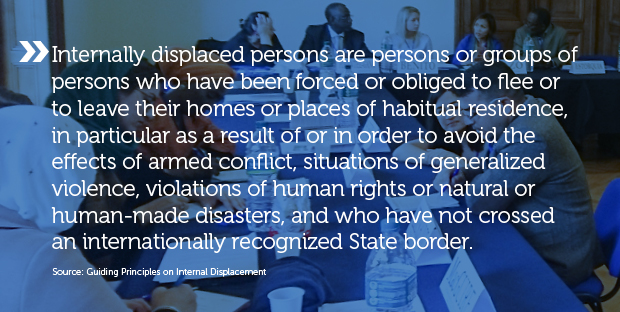Raising awareness and building the capacities of government officials is critical to help improve responses to internal displacement, as precisely governments are the main responsible for the protection of their IDPs.
At the annual course on the Law of Internal Displacement government representatives strengthened their knowledge about IDP protection as well as shared their own experiences on addressing internal displacement and developing legal frameworks to protect IDPs (national legislation and policies). For the third time we had the pleasure to contribute to these efforts by facilitating a session on data collection and collaborative displacement profiling.

The Special Rapporteur on the human rights of IDPs opens the course.
The five-day course, which took place from October 16th – 21st in Sanremo (Italy), is organised by the International Institute of Humanitarian Law in cooperation with the Mandate of the Special Rapporteur on the Human Rights of IDPs and UNHCR. Course sessions included lectures, case studies, simulations, and practical exercises led by multiple experts.
For JIPS, this was an excellent opportunity to highlight the value of collaborative, agreed-upon data that can be used as input for the development of policies and solutions to internal displacement. Through the collaboration with the Mandate of the Special Rapporteur, UNHCR and the International Institute of Humanitarian Law, we aim to contribute to stronger national responses to internal displacement.
Course participants included representatives from 9 countries, both from national and local level institutions. Although coming from widely different geographical contexts – Afghanistan, Honduras, Kenya, Somalia, Myanmar, the Philippines, Ukraine, Iraq and Nigeria – discussions during the course also highlighted some common challenges.
One of the issues addressed related to the definition of who is an IDP and what conditions lead to internal displacement. The Guiding Principles on Internal Displacement provide a comprehensive explanation, which covers many categories of people who can be considered as IDPs, and take into account various factors such as location, distance of movement or nationality. In specific contexts, however, it can be difficult to define who is an IDP, e.g in situations of slow-onset disasters when the reasons for movements are varied and interlinked.
Another question raised, based on the Guiding Principles, refereed to situations of generalised violence: how can this concept be operationalised, i.e. where is the threshold when violence becomes generalised? The Guiding Principles do not provide a clear-cut answer.

Definition of an IDP according to the Guiding Principles on Internal Displacement.
During the session on data collection, participants discussed how critical ownership of the data by governments was, and expressed their interest to learn more about profiling in displacement situations. In this context, we shared our profiling experiences from Somalia and Honduras: while these countries witness very different displacement situations, in both cases the data produced by collaborative exercises provided valuable agreed-upon and shared evidence-bases that helped inform national IDP policies. We are happy to continue to engage in the dialogue with governments to strengthen IDP protection, assistance and solutions.